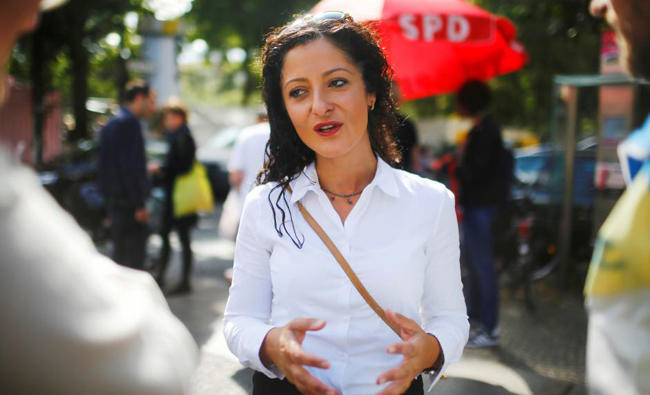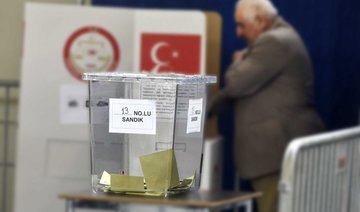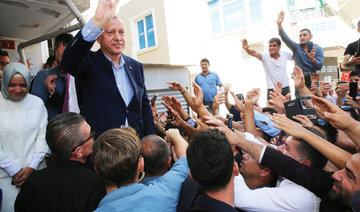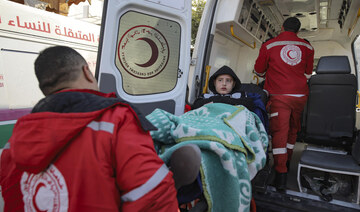BERLIN: Nihan Sen’s grandmother came to Germany in the 1960s but still speaks no German. By contrast, Nihan herself is a star of German youth culture, with 783,000 followers for her YouTube channel. Yet she acknowledges: “I really do like a bit of Turkish television.”
She is not alone. Turkish broadcasters have an 84 percent market share among Germany’s 3 million people of Turkish background, and 40 percent of them watch no German television at all, according to market researcher Data4U.
As a captive audience of television broadcast from Ankara, Germany’s Turkish citizens are caught in a tug-of-war for their loyalty ahead of a German national election on Sept. 24.
Turkey’s president, Recep Tayyip Erdogan, has called on German voters of Turkish background to reject Germany’s mainstream political parties, saying they are “unfriendly to Turkey.”
The parties worry that Erdogan has more access to Turkish-speaking German voters than they do.
Green Party co-leader Cem Ozdemir, the most prominent German politician of Turkish descent, has called for Germany’s public media to start broadcasting a Turkish channel for the benefit of Turks, both in Germany and in Turkey.
“We need a German-Turkish broadcaster,” he told the Rheinische Post newspaper in March. “For years we’ve neglected to help people from Turkey find a new political homeland, also politically, and now we’re seeing the fruits of that.”
Traditionally, Turks in Germany have voted mainly for the Social Democrats or the Greens, the main center-left parties, which are known for being friendly to immigrants. But Erdogan has repeatedly urged them instead to reject both those parties, as well as Merkel’s ruling conservatives.
“The majority, because they only watch Turkish TV, are informed very one-sidedly,” said Joachim Schulte, head of Data 4U, which specializes in polling Germany’s Turks. Schulte believes Erdogan’s call could sway 300,000 votes — a quarter of the Germans of Turkish descent who are eligible to vote.
For now, voters of Turkish descent who turn away from the Social Democrats and Greens have few other choices. Schulte said those who become disaffected are more likely to stay home than back rival parties. But that could still affect the outcome in an election that is likely to be hard fought for every vote.
A change in Germany’s citizenship law in 2000 means the number of ethnic Turks with the right to vote has nearly doubled over the past decade, increasing their importance as a bloc. Polls show most Turks in Germany backed Erdogan when voting as expatriates in Turkish elections.
For Erdogan, having influence over voters in Germany provides a chance to settle scores with German politicians he sees as enemies, while burnishing his credentials at home as a defender of Turks everywhere.
Germany’s mainstream parties have been outspoken critics of Turkey’s crackdown since a failed coup last year, in which thousands of Turks have been jailed, including around a dozen who hold German citizenship. Turkey also demands that Germany hand over asylum seekers it accuses of involvement in the coup.
For the Social Democrats and Greens, losing the Turkish vote poses a real risk: even a small swing could weaken them in potential talks with the conservatives about setting up a government after the vote.
In recent weeks, a new party, the Alliance of German Democrats, led by ethnic Turks, has campaigned with a poster of Erdogan. “Friends of Turkey,” it reads. “Stand with them!“
So far the new party is polling below one percent nationally and fielding candidates only in North Rhine-Westphalia, the big Western state home to more than a fifth of Germany’s population. The national prospects for a minority ethnic party may be limited in a country with a 5 percent threshold to win seats, but a party appealing directly to Turks could undermine the bigger parties.
“Our poster was a quote from Erdogan: He was criticizing German politics and saying we should vote for parties that are our friends,” said party spokesman Ertan Toker. “Unlike the other German parties that are always negative about Erdogan, we are not. We saw this as him encouraging us to vote.”
Among the causes the new party has taken up: Making it easier for ethnic Turks in Germany, most of whom still don’t have the right to vote, to gain it. That struck a chord for Rascha, a 17-year-old Turkish girl in Duisburg, North Rhine-Westphalia.
“I was born here and I still don’t have a German passport,” she said. “The process for getting one is long and bureaucratic. There’s a new party that wants to give all permanent residents voting rights.”
Turkish community leaders from the big political parties say Erdogan’s interventions into German politics are undoing decades of work on promoting integration.
“The political climate is poisoned by this,” said Cansel Kiziltepe, Social Democrat parliamentary candidate in Berlin’s multi-ethnic Kreuzberg district, where the Social Democrats, Greens and conservatives are all fielding candidates with Turkish roots. “President Erdogan has torn down what we have built up over decades.”
“We get threats, e-mails as ethnic Turkish lawmakers saying we aren’t sufficiently loyal as ‘Turks’,” Kiziltepe said. “But I am a German politician and I do politics for Germany and for all people who live here.”
Timur Husein of Merkel’s Christian Democratic Union was categorical about his loyalties: “I am German, only German,” said the son of a Turkish father and a Croatian mother.
For YouTube personality Nihan, who confessed her passion for Turkish TV during an interview with Social Democrat leader Martin Schulz, the worry was that some Turks would end up alienated from wider German society.
“What can we do to stop parallel societies from emerging?” she asked Schulz.
Schulz was reassuring. “It’s not bad, or even hard, to have two identities. Why should you deny your roots?”
German parties fret about Turkish voters
German parties fret about Turkish voters

Palestinian ministry says Israeli raid in West Bank kills one

The Israeli military launched a major offensive in the West Bank last month dubbed “Iron Wall” aimed at rooting out Palestinian armed groups from the Jenin area, which has long been a hotbed of militancy.
The Palestinian health ministry said Sunday that a 73-year-old man had been killed by Israeli gunfire in the city’s adjacent refugee camp.
Witnesses reported a “large” deployment of Israeli forces in the morning around the towns of Tubas and Tamun, southeast of Jenin.
An AFP journalist said the army was blocking the exits of the nearby Faraa refugee camp and entering homes. Drones were also visible in the sky.
The army said early on Sunday that a “tactical group” had begun operations around Tamun and uncovered weapons.
It added it was “extending the counterterrorism operation... to five villages.”
It also distributed leaflets in Arabic saying the operation was meant to “eradicate armed criminals, the lackeys of Iran.”
The Israeli government accuses Iran, which backs armed groups across the Middle East including Hamas in Gaza, of attempting to send weapons and money to militants in the West Bank.
The leaflets warned residents not to approach Israeli forces.
On Saturday, Israel conducted two air strikes in Jenin, and also “struck and eliminated a terrorist cell on its way to carry out an imminent terrorist attack” in Qabatiya, the military said adding “two terrorists” were killed.
“After the strike, secondary explosions due to explosives that were inside the vehicle were identified,” it said on Sunday.
Islamic Jihad’s military wing confirmed in a statement on Sunday that two of its fighters were among those killed.
The military said one of those killed had been released from Israeli detention in 2023 as part of the first truce in the Gaza war.
The Palestinian health ministry said on Saturday evening that Israeli strikes in the Jenin area had killed five people, including a 16-year-old.
When asked about that strike, the military told AFP it had “struck armed terrorists.”
Violence has surged across the West Bank since the Gaza war broke out in 2023.
Israeli troops or settlers have killed at least 882 Palestinians, including many militants, in the West Bank since the start of the war, according to the Palestinian health ministry.
At least 30 Israelis have been killed in Palestinian attacks or Israeli military raids in the territory over the same period, according to Israeli official figures.
Criminal probe launched into Israel PM’s wife: state attorney’s office

- In the first case, Netanyahu and his wife are accused of accepting more than $260,000 worth of luxury goods from billionaires in exchange for political favors
JERUSALEM: Israeli police are conducting a criminal investigation into Sara Netanyahu, the wife of Israeli Prime Minister Benjamin Netanyahu, the office of the state attorney said in a letter made public on Sunday.
“A criminal investigation was opened” into suspected criminal offenses, the office said in a letter to an Israeli opposition lawmaker who had accused Sara Netanyahu of tampering in her husband’s corruption trial after the broadcast in December of a television news investigation.
Naama Lazimi, Knesset member for the Democrats, shared the letter on X on Sunday confirming the criminal investigation was launched on December 26, adding that her office had contacted the state attorney following the investigation by Israeli Channel 12’s Uvda news program.
The show alleged that Sara Netanyahu had tried to intimidate a key witness in her husband’s ongoing corruption trial.
She also organized demonstrations to harass the Attorney General, his deputy and other individuals deemed hostile to her husband, according to the program.
The state attorney’s office added the investigation was being “conducted by the Israel Police accompanied by the cyber department of the state attorney’s office.”
In December, Benjamin Netanyahu testified in the corruption trial in which he faces charges of bribery, fraud and breach of public trust in three separate cases, calling the charges against him “ridiculous.”
The trial, which had been delayed many times since it first began in May 2020, is scheduled to last for months, with an appeals process that could further prolong matters.
Netanyahu, who filed multiple requests to delay the proceedings based on the wars in Gaza and Lebanon, has steadfastly denied any wrongdoing.
In the first case, Netanyahu and his wife are accused of accepting more than $260,000 worth of luxury goods such as cigars, jewelry and champagne from billionaires in exchange for political favors.
He is the first sitting premier to face criminal trial in the country.
Qatar’s prime minister calls on Hamas, Israel to begin immediate talks on Gaza ceasefire phase two

- According to the ceasefire agreement, negotiations on implementing the second phase of the deal should begin before the 16th day of phase one of the ceasefire, which is Monday
DOHA: Qatar’s prime minister on Sunday called on Israel and Hamas to immediately begin negotiating phase two of the Gaza ceasefire, adding that there is no clear plan for when talks will begin.
“We demand (Hamas and Israel) to engage immediately as stipulated in the agreement,” Sheikh Mohammed bin Abdulrahman Al Thani said at a press conference held jointly with Turkiye’s foreign minister in the Qatari capital Doha on Sunday.
According to the ceasefire agreement, negotiations on implementing the second phase of the deal should begin before the 16th day of phase one of the ceasefire, which is Monday.
Israel and Hamas last month reached a complex three-phase accord that has halted the fighting in Gaza. Hamas has so far released 18 hostages in exchange for Israel releasing hundreds of Palestinians held in Israeli prisons.
There are more than 70 hostages still held in Gaza.
The second stage of the accord is expected to include Hamas releasing all remaining hostages held in Gaza, a permanent end to hostilities and the complete withdrawal of Israeli forces from the enclave.
“There is nothing yet clear about where the delegations will come and when it’s going to take place,” Sheikh Mohammed said.
Mediators have engaged with Hamas and Israel over the phone and Qatar has set an agenda for the next phase of negotiations, he said.
“We hope that we start to see some movement in the next few days. It’s critical that we get things rolling from now in order to get to an agreement before day 42.”
Israeli Prime Minister Benjamin Netanyahu’s office said he would begin negotiations on phase two of the agreement on Monday in Washington, when he is set to meet US President Donald Trump’s Middle East Envoy, Steve Witkoff.
During his meeting with Witkoff, Netanyahu will discuss Israel’s positions in respect to the ceasefire, the prime minister’s office said. Witkoff will then speak with officials from Egypt and Qatar, who have mediated between Israel and Hamas over the past 15 months with backing from Washington.
Four Palestinians wounded in Israeli strike on a car in Gaza

- Israeli military said Israeli aircraft fired on what military described as suspicious vehicle moving toward northern Gaza outside the inspection route laid down by ceasefire
CAIRO/JERUSALEM: At least four Palestinians were wounded in an Israeli strike on Sunday on a vehicle on the coastal road west of the Nuseirat camp in the central part of the Gaza Strip, medics told Reuters.
Medics first announced that a young boy had been killed in the strike, but later said they had managed to resuscitate him.
The Israeli military said an Israeli aircraft fired on what the military described as a suspicious vehicle moving toward northern Gaza outside the inspection route laid down by the ceasefire agreement.
“The IDF (Israeli military) is prepared for any scenario and will continue to take any necessary actions to thwart any immediate threat to IDF soldiers,” it said, giving no details on the impact of the strike or any casualties.
Several Palestinians have been reported killed by Israeli fire since a ceasefire agreement between Israel and Hamas took effect on Jan. 19. Israel said its forces have opened fire in incidents where “suspicious” figures, sometimes armed, posed a risk to Israeli forces deployed at some areas of Gaza as stipulated by the phased deal.
Hamas has described these incidents as violations of the truce.
During the first phase of the ceasefire, 33 children, women and older male hostages as well as sick and injured, were due to be released. Of these, 18 have been freed so far. More than 60 male hostages of military age will remain captive until a second phase is negotiated.
Negotiations are due to start by Tuesday on agreements for the release of the remaining hostages and the withdrawal of Israeli troops from Gaza in a second phase of the deal, which is intended to lead to a final end of the war in Gaza.
Later on Sunday, Hamas accused Israel of stalling over the implementation of the humanitarian part of the deal, saying Israel has yet to permit the entry of the needed medical, relief, fuel, and reconstruction supplies as per the agreement.
“We urge the mediators and guarantors of the ceasefire agreement to compel the occupation (Israel) to allow the entry of relief materials according to the agreement, most urgently needed are tents, fuel, food materials, and heavy machinery,” said the group’s spokesperson, Hazem Qassem.
There was no immediate Israeli comment on Hamas’ remarks.
Turkiye could accept some Palestinians freed by Israel: FM

- ‘Our president has declared that we are ready to take in some freed Palestinians... in order to support the agreement’
- ‘Turkiye, along with other countries, will do its part in this regard so the ceasefire agreement can remain in force’
DOHA: Turkiye could take in some Palestinian prisoners freed by Israel under the terms of its ceasefire deal with Hamas, Foreign Minister Hakan Fidan said during a visit to Qatar on Sunday.
“Our president has declared that we are ready to take in some freed Palestinians... in order to support the agreement. Turkiye, along with other countries, will do its part in this regard so the ceasefire agreement can remain in force,” he said at a press conference in Doha.



















